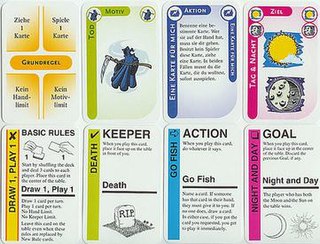
Fluxx is a card game, played with a specially designed deck published by Looney Labs. It is different from most other card games, in that the rules and the conditions for winning are altered throughout the game, via cards played by the players.
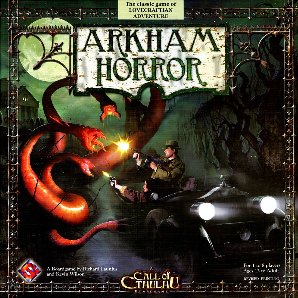
Arkham Horror is a cooperative adventure board game designed by Richard Launius, originally published in 1987 by Chaosium. The game is based on Chaosium's roleplaying game Call of Cthulhu, which is set in the Cthulhu mythos of H.P. Lovecraft and other horror writers. The game's second edition was released by Fantasy Flight Games in 2005, with a third edition in 2018.

Pandemic is a cooperative board game designed by Matt Leacock and first published by Z-Man Games in the United States in 2008. Pandemic is based on the premise that four diseases have broken out in the world, each threatening to wipe out a region. The game accommodates two to four players, each playing one of seven possible roles: dispatcher, medic, scientist, researcher, operations expert, contingency planner, or quarantine specialist. Through the combined effort of all the players, the goal is to discover all four cures before any of several game-losing conditions are reached.

7 Wonders is a board game created by Antoine Bauza in 2010 and originally published by Repos Production. Three decks of cards featuring images of historical civilizations, armed conflicts, and commercial activity are used in the card drafting game 7 Wonders. The game received critical success upon its release, and won numerous awards, including the inaugural Kennerspiel des Jahres connoisseurs' award in 2011.
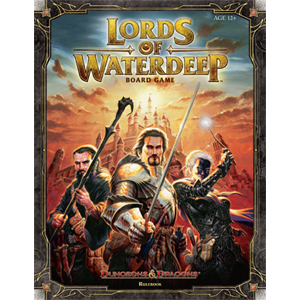
Lords of Waterdeep is a German-style board game designed by Peter Lee and Rodney Thompson and published by Wizards of the Coast in 2012. The game is set in Waterdeep, a fictional city in the Forgotten Realms campaign setting for the Dungeons & Dragons role-playing game. Players take the roles of the masked rulers of Waterdeep, deploying agents and hiring adventurers to complete quests and increase their influence over the city.
Evolution: The Origin of Species is a card game created by Dmitriy Knorre and Sergey Machin in 2010. The game is inspired by the evolutionary biology. It was published by SIA Rightgames RBG. English, French and German game editions were published in 2011. Two or more players create their own animals, make them evolve and hunt in order to survive.

Codenames is a 2015 party card game designed by Vlaada Chvátil and published by Czech Games Edition. Two teams compete by each having a "spymaster" give one-word clues that can point to multiple words on the board. The other players on the team attempt to guess their team's words while avoiding the words of the other team. Codenames received positive reviews and won the 2016 Spiel des Jahres award for the best board game of the year.
The Oregon Trail is a series of card games and a board game based on the video game of the same name, produced by Pressman Toy Corporation.

Love Letter is a card game introduced in May 2012 and designed by Seiji Kanai. Its first English-language edition was produced in the United States by Alderac Entertainment Group (AEG) until 2018, when Love Letter was acquired by Z-Man Games.
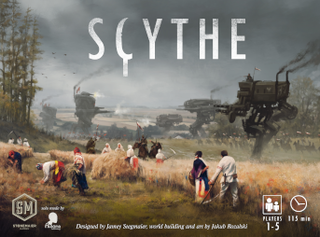
Scythe is a board game for one to five players designed by Jamey Stegmaier and published by Stonemaier Games in 2016. Set in an alternative history version of 1920s Europe, players control factions that produce resources, develop economic infrastructure, and use dieselpunk combat mechs to engage in combat and control territories. Players take up to two actions per turn using individual player boards, and the game proceeds until one player has earned six achievements. At this point, the players receive coins for the achievements they have attained and the territories they control, and the player with the most coins is declared the winner.

Terraforming Mars is a board game for 1 to 5 players designed by Jacob Fryxelius and published by FryxGames in 2016, and thereafter by 12 others, including Stronghold Games. In Terraforming Mars, players take the role of corporations working together to terraform the planet Mars by raising the temperature, adding oxygen to the atmosphere, covering the planet's surface with water and creating plant and animal life. The game incorporates elements of resource management, engine building, and strategic planning. Players compete to earn the most victory points, which are measured by their contribution to terraforming and to human infrastructure. These goals are achieved by collecting income and resources which allow them to play various projects, represented by cards that increase their income or resources, build infrastructure, or directly contribute to terraforming the planet. The game was received positively by fans and critics, and received numerous awards.
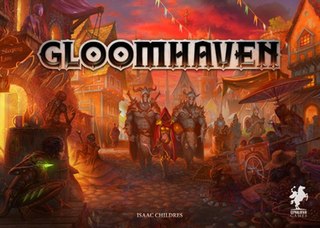
Gloomhaven is a cooperative board game for one to four players designed by Isaac Childres and published by Cephalofair Games in 2017. It is a campaign-based dungeon crawl game including a narrative campaign, 95 unique playable scenarios, and 17 playable classes. Since its introduction the game has been acclaimed by reviewers, and has been described as one of the best board games ever made.
Evolution: Random Mutations is a card game created by Dmitriy Knorre and Sergey Machin in 2010. The game is inspired by the evolutionary biology. It was published by SIA Rightgames RBG. Publishing of the game was financed in Boomstarter. English, French and German game editions were published in 2014.

Wingspan is a board game designed by Elizabeth Hargrave and published by Stonemaier Games in 2019. It is a card-driven, engine-building board game in which players compete to attract birds to their wildlife reserves. During the game's development process, Hargrave constructed personal charts of birds observed in Maryland, with statistics sourced from various biological databases; the special powers of birds were also selected to resemble real-life characteristics. Upon its release, Wingspan received critical and commercial acclaim for its gameplay, accurate thematic elements, and artwork. The game also won numerous awards, including the 2019 Kennerspiel des Jahres. Several expansions and a digital edition have been subsequently published.

Root: A Game of Woodland Might and Right is a 2018 asymmetric board game designed by Cole Wehrle, illustrated by Kyle Ferrin, and published by Leder Games. In Root, players compete for the most victory points through moving and battling using varying functions with unique abilities. Upon its release, Root received positive reviews, and was followed by four expansions. A digital version, developed by Dire Wolf Digital, was released in 2020.

Patchwork is a two-player board game created by Uwe Rosenberg. It was released in 2014.

Sagrada is a dice-drafting board game published by Floodgate Games.
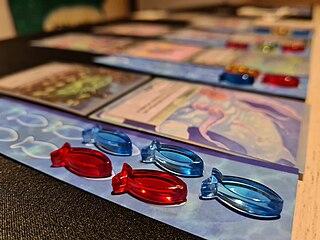
Oceans is a nature-themed strategy board game published in 2020 by North Star Games. It is a game in the Evolution series.

Cartographers is a roll and write board game designed by Jordy Adan and published in 2019 by Thunderworks Games. It is part of the Roll Player universe. In the game, players aim to draw terrains based on drawn cards that award points based on the relevant letter cards. The game received positive reviews, and was nominated for the Kennerspiel des Jahres, but lost to The Crew. It was also runner-up to Parks for the Best Family Game of the 2019 Board Game Quests Awards. An app for solitary play was released in 2020.

Watergate is a 2019 board game published by Capstone Games. Players take on the roles of either Richard Nixon or the editors of various newspapers during the Watergate scandal, and play cards that could gain momentum, initiative, evidence or informant tokens. The Nixon administration wins the game if five momentum tokens are gained, whereas the editor wins if two informant tokens are connected, thus breaking the story. Watergate received positive reviews.

















